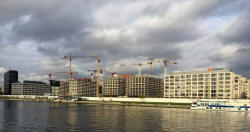|
The main factor holding firms back in Europe's biggest economy
is a shortage of skilled labor, the IW economic institute in
Cologne said.
Its poll showed that 26 of 48 industry associations were more
upbeat than they were at the end of 2016 and more than two-
thirds expected firms in their sector to produce more next year
than this.
"Despite the protectionist policies of U.S. President Donald
Trump and prospect of Brexit, investment in Germany rose this
year and will strengthen further in 2018," said IW in a
statement.
Only two sectors were pessimistic - the food industry, which is
worried about tougher competition and higher costs, and sections
of the cooperative banking sector which are suffering from low
interest rates and margins.
The IW said 24 of the 47 industry associations which gave
investment estimates, expect higher spending levels from their
member companies.
The main factor holding back firms is a shortage of skilled
labor, a long-standing concern in Germany.
"The production prospects in the German economy could be better
if more skilled workers were available," said IW Director
Michael Huether.
Most economists expect the German economy to grow for the ninth
consecutive year in 2018. Earlier this month, the Ifo institute
forecast 2.6 percent growth for next year, following an expected
expansion of 2.3 percent for this year.
A separate survey of 820 mostly family-owned businesses, showed
that 69 percent expected improvements in their operating
business next year, up from 59 percent a year ago.
(Reporting by Rene Wagner; Writing by Madeline Chambers; Editing
by Andrew Bolton)
[© 2017 Thomson Reuters. All rights
reserved.] Copyright 2017 Reuters. All rights reserved. This material may not be published,
broadcast, rewritten or redistributed.
 |
|




